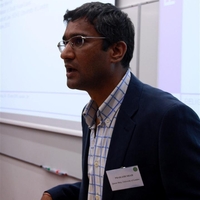Prakash Shah
Queen Mary, University of London, Law, Faculty Member
The Indian caste system is an ancient, pervasive institution of social organization within the subcontinent – or is it? Dr. Prakash Shah (Reader in Culture and Law at the Queen Mary University of London, UK) speaks to Dr. Raj Balkaran... more
The Indian caste system is an ancient, pervasive institution of social organization within the subcontinent – or is it? Dr. Prakash Shah (Reader in Culture and Law at the Queen Mary University of London, UK) speaks to Dr. Raj Balkaran about his co-edited work, Western Foundations of the Caste System (Palgrave Macmillan, 2017). Ranging from ancient Indian history to modern British law, the contributions to this book advance a provocative thesis, namely, that what we refer to as Indian caste is more a function of Western Christian encounters with India than anything historically occurring on Indian soil. Could this be the case? Could the caste system constitute a projection born of Western interpretive bias rather than an ancient Indian indigenous social institution?
Research Interests:
The freedom of religion is enshrined in binding international instruments at the UN and regional levels. To that extent one can, of course, claim that it is a fundamental right. Yet some recent critical studies are claiming that freedom... more
The freedom of religion is enshrined in binding international instruments at the UN and regional levels. To that extent one can, of course, claim that it is a fundamental right. Yet some recent critical studies are claiming that freedom of religion is also an impossibility. Put differently, the claim may take the following form: because freedom of religion is an idea that first finds expression in a Christian theological context using it compels one to do theology. This presentation is aimed at fleshing out a variation of such a claim. It accepts that the freedom of religion first came about in a Christian theological context. However, to say that is not enough of an argument against its universal application. We require more. We have to answer questions about what its foundation in a theological context entails. In other words: why does the fact that religious freedom was once enunciated in Christian theology prevent it being accessible to people from different cultures around the world who may not be Christians? How would such an argument withstand the counter-claim that, even though a once-Christian idea, religious freedom is today a secular human rights concept that traverses cultural boundaries and is invoked by peoples of all cultures throughout the world?
Research Interests:
Research Interests: Religion, Christianity, Comparative Religion, Sociology of Religion, Islamic Law, and 13 moreTransnationalism, Religion and Politics, Private International Law, Islamic Contemporary Studies, Muslim Family Law, Islamic Studies, Muslim Minorities, Christian Ethics, Muslims in Europe, Transnational migration, Diaspora and transnationalism, Transnational litigation, and Anthropology of Religion
This paper was presented at the Zutshi-Smith Symposium on the Commission on Religion and Belief on British Public Life (CORAB), University of Bristol, 15-16 December 2016.
Research Interests:
In caste studies today there is certainty about the existence of a caste system in India. This certainty extends to the existence of such a system in the Indian diaspora. However, whenever an assessment is attempted as to what the... more
In caste studies today there is certainty about the existence of a caste system in India. This certainty extends to the existence of such a system in the Indian diaspora. However, whenever an assessment is attempted as to what the properties of the caste system are, we encounter anomalies. Yet the awareness of anomalies does not lead to the questioning of why there is certainty about the existence of the system. This lecture given by Prakash Shah at the Indian Council for Historical Research, New Delhi on 9 November 2016, presents the results of collaborative research which is due to be shortly published as a book. The research shows that when the caste system idea is interrogated more deeply one cannot maintain the stance that such a system exists in India at all. Rather, we can now show that the idea of an Indian caste system is a feature of Western culture and its way of coming to terms with its experience of India. Hence our book bears the title, Western Foundations of the Caste System (eds. Martin Farek, Dunkin Jalki, Sufiya Pathan and Prakash Shah). We can now show that contemporary ideas about the caste system and the certainty about its existence are dependent on Christian theological reflections on Indian society and culture. Multiple questions are consequently raised about what various movements in India said to be fighting the caste system, what the laws and policies of caste-based reservation, what legislation against caste atrocities, and what the recent law against caste discrimination in the UK, are really meant to be doing. If their foundations are false then critical new questions should also arise about what our understanding and future study of India should be concerned with.
